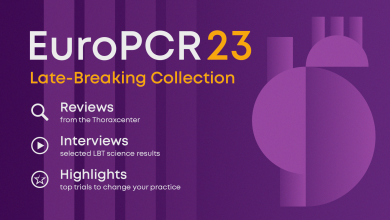Search results
Provisional LM Stenting
Start date:
Jun 10, 2021
End date:
Jun 10, 2021
Event
Author(s):
Nicolas Foin
,
Eduardo Alegria-Barrero
,
Ryo Torii
,
et al
Added:
3 years ago
Drug-eluting stents (DESs) have contributed to a significant lowering of the incidence of restenosis and target vessel revascularisation (TVR) in bifurcations.1–4 A randomised study of bifurcation lesions using sirolimus-eluting stents revealed restenosis rates of only 4 % in the main branch (MB) and a TVR rate as low as 8.2 % at six-month follow-up,2 a marked improvement over that in historical…
View more
Provisional Stenting Tricks
Author(s):
Francesco Burzotta
,
Carlo Trani
Added:
3 years ago
Article
Author(s):
Sandeep Arunothayaraj
Added:
11 months ago
EuroPCR 23 —We are joined onsite by Dr Sandeep Arunothayaraj (University Hospitals Sussex NHS Foundation Trust, UK) to discuss the findings from a five-year follow-up of the EBC Two Trial. (NCT01560455)
EBC Two investigated single-stent versus dual-stent techniques in treating large bifurcation lesions. Over 200 patients were enrolled in the trial.The study found that routine culotte did not…
View more
Treatment of Bifurcation Coronary Artery Disease with the Dedicated Cappella Sideguard® Stent
Author(s):
Mamas A Mamas
,
Farzin Fath-Ordoubadi
Added:
3 years ago
Article
Author(s):
Helen Routledge
Added:
3 years ago
The preferred treatment approach for bifurcation disease can be generally summed up as ‘keep it simple’, otherwise known as provisional stenting. Based on several contemporary studies, coronary interventionalists have settled on a minimalist approach: starting with a single-stent approach for the main vessel (MV) and ignoring side branch (SB) disease unless clinical circumstances warrant…
View more
Author(s):
Maciej Lesiak
Added:
3 years ago
While provisional stenting has remained the preferred strategy for majority of bifurcation lesions, controversies still exist regarding when and how to use complex techniques. Most of randomised studies comparing simple and complex approaches have focused on selected populations, included both ‘true’ and ‘non-true’ bifurcation lesions, used first-generation drug eluting stents (DES) and favoured…
View more
Author(s):
Goran Stankovic
,
Zlatko Mehmedbegovic
,
Milorad Zivkovic
Added:
3 years ago
Approximately 15–20% of percutaneous coronary interventions (PCIs) are performed to treat coronary bifurcations. These procedures are renowned for being technically challenging and historically have been associated with lower procedural success rates and worse clinical outcomes compared with non-bifurcation lesions.1,2
A bifurcation lesion is a lesion occurring at, or adjacent to, a significant…
View more
Author(s):
David Hildick-Smith
Added:
11 months ago
EuroPCR 23 - Join us as we discover the latest findings from a three-year follow-up of the EBC MAIN Trial, as we interview Principal Investigator Dr David Hildick-Smith (Brighton and Sussex University Hospitals, UK) onsite at EuroPCR 23.
The EBC Main Trial aimed to investigate the outcomes of single-stent versus dual-stent bifurcation treatment of distal left main coronary artery lesions. This…
View more
EuroPCR 2023: Late-Breaking Science Video Collection
Author(s):
D Scott Lim
,
Sandeep Arunothayaraj
,
Paul Sorajja
Added:
11 months ago
Video Series














